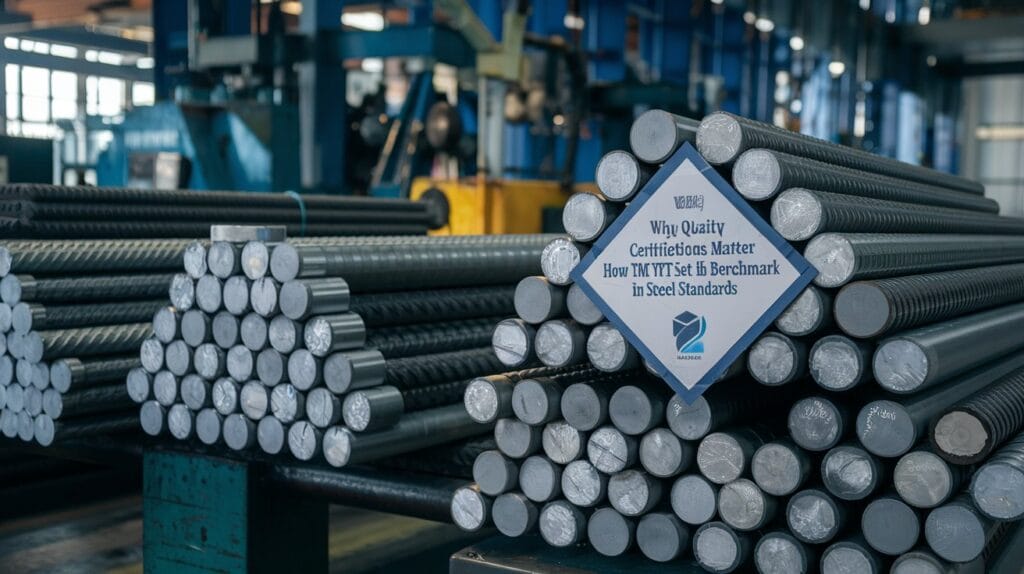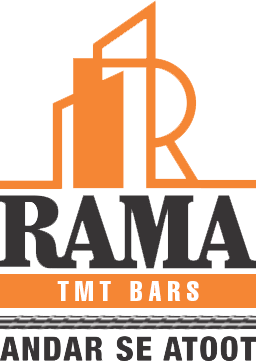In the construction industry, steel is undeniably one of the most critical materials, serving as the backbone for infrastructure, whether it’s residential buildings, commercial complexes, bridges, or highways. The quality of the steel used in construction plays a pivotal role in the stability, strength, and longevity of a structure. When it comes to TMT Bars for Construction, quality certifications are a crucial determinant that ensures the reliability and performance of the material.
TMT Bars (Thermo-Mechanically Treated Bars) have gained widespread popularity for their exceptional strength and flexibility, but it’s the quality certifications associated with these bars that truly define their excellence. These certifications are not just formalities; they are essential guarantees that the product adheres to stringent standards for performance and safety.

The Importance of Quality Certifications in TMT Bars
Quality certifications serve as a guarantee of safety, strength, and reliability in construction materials. For TMT Bars for Construction, these certifications ensure that the steel bars meet critical specifications that are vital for the performance and durability of the final structure.
Some of the most significant quality certifications that affect high-strength TMT bars and other steel products include:
- ISI Certification (Bureau of Indian Standards - BIS): This certification ensures that the TMT bars conform to national quality standards. ISI-certified TMT bars are reliable for both residential and industrial construction.
- ISO Certifications (ISO 9001, ISO 14001): These certifications ensure that the steel manufacturer adheres to international standards for quality management, environmental responsibility, and continuous improvement.
- Tempcore License (from CRM Belgium): This license confirms that the steel has undergone advanced quenching and tempering processes that significantly improve its mechanical properties and resistance to wear.
- Environmental Certifications: These align the production of steel with sustainable practices and ensure the material is eco-friendly, a crucial aspect in today’s green construction practices.
These certifications instill confidence in the consumer, ensuring that the TMT bars they are purchasing are both high-quality and safe for use in construction.
How TMT Bars Set the Benchmark in Steel Standards
TMT Bars have revolutionized the construction industry by providing a perfect blend of strength, flexibility, and durability. The manufacturing process of TMT Bars for Construction is what sets them apart from conventional mild steel, giving them superior characteristics that make them ideal for a variety of construction applications.
1. Manufacturing Process of TMT Bars
TMT bars are produced using a sophisticated process known as the Tempcore process, which involves high-temperature treatment followed by rapid cooling. This process gives TMT bars their unique combination of hardness on the outside and ductility on the inside.
The outer surface of the TMT bar is hardened, making it resistant to external wear and corrosion, while the inner core remains soft and flexible, ensuring that the bars can withstand high seismic stresses without breaking. This makes them ideal for use in regions prone to earthquakes or other dynamic forces.
2. Superior Strength and Flexibility
One of the primary reasons TMT Bars have set the benchmark for steel standards is their high strength-to-weight ratio. High-strength TMT bar allows builders to use less steel for greater strength, which directly reduces the overall weight of the structure. This combination of strength and flexibility makes TMT bars ideal for reinforced concrete, where the steel must both bear heavy loads and adapt to the shifting stresses of the structure.
The ribbed surface of the TMT bars ensures excellent bonding with concrete, improving the composite action between steel and concrete, and ultimately contributing to a more resilient and stable structure.
3. Corrosion Resistance
Corrosion is one of the primary concerns when it comes to construction materials, especially in areas with high humidity, coastal environments, or regions with severe temperature fluctuations. Corrosion-resistant TMT Bars are designed to resist the effects of moisture, salt, and other environmental factors that cause rusting and deterioration.
TMT bars undergo controlled cooling processes that enhance their corrosion resistance. Their low carbon content and perfect microstructure make them ideal for structures exposed to adverse weather conditions or areas with a high salt concentration in the atmosphere.
4. Earthquake Resistance
In seismic zones, the structural integrity of buildings is vital for the safety of occupants. Durable and safe TMT bars in Raipur, for example, are engineered to withstand the forces of earthquakes. The inherent flexibility and toughness of these bars ensure that structures are less likely to collapse or suffer significant damage during seismic events.
TMT bars are designed to absorb and distribute stress efficiently, reducing the chances of structural failure during tremors or other dynamic forces. Their resilience to bending and stretching allows them to perform better under tension and pressure, a critical factor when designing buildings and bridges in earthquake-prone regions.
The Role of Certifications in Ensuring Quality
Without the proper certifications, it’s impossible to guarantee the quality of construction materials. Certification ensures that each batch of TMT bars has undergone rigorous testing to meet specific standards of performance. These tests evaluate several factors, including:
- Tensile strength: The ability of the steel to withstand stress without breaking.
- Ductility: The flexibility of the material to bend without fracturing.
- Corrosion resistance: The ability of the steel to resist rust and degradation over time.
- Bonding strength: The ability of the bars to bond with concrete for better structural integrity.
Manufacturers that adhere to these rigorous testing protocols and have the necessary certifications are offering a product that not only meets but exceeds industry expectations. For those looking to purchase the best Sariya for reinforced concrete, these certifications are an essential marker of quality and reliability.
The Best TMT Bars for Reinforced Concrete: A Safe Investment
Choosing the right material for reinforced concrete is crucial for the safety, performance, and durability of the structure. TMT Bars for Construction are designed to offer the best balance of strength, durability, and flexibility. Their superior bonding properties with concrete, along with their ability to withstand harsh environmental conditions, make them the best choice for reinforced concrete applications.
In regions like Raipur, where the construction industry is booming, selecting corrosion-resistant TMT Bars ensures that buildings will withstand the test of time, whether it’s the humid monsoon season or the scorching summer heat.
Quality certifications serve as a seal of trust and assurance in the construction industry. They ensure that the materials being used adhere to the highest standards of safety and performance. When it comes to TMT Bars for Construction, certified products like high-strength TMT Bars (Sariya) are essential for ensuring the structural integrity of buildings, bridges, and other infrastructure.
Investing in certified TMT bars means choosing safety, durability, and long-term value. Whether you’re in Raipur or any other region, choosing durable and safe TMT bars ensures that your construction project stands strong against time, environmental factors, and dynamic stresses.
